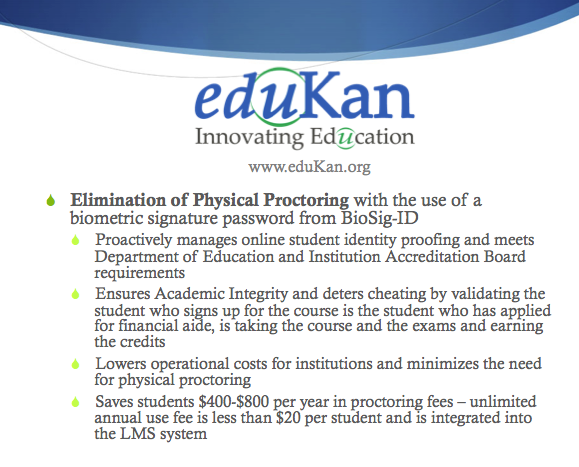Dr. Sarver will be a panelist at the HigherEdTECH Summit discussing eduKan’s successful use of analytics to track student progress in distance education to improve student retention, identify at-risk students, & better manage learning outcomes.
Dr. Mark Sarver, CEO of eduKan, a consortium of colleges in Kansas, will be speaking at the 2013 HigherEdTECH Summit at the CES (International Consumer Electronics Show), Thursday, January 10th 2013 at the Las Vegas Convention Center. Dr. Sarver will be joining a group of expert panelists who will be talking about using analytics gleaned from educational data to understand what’s working and what isn’t in addition to platforms and technology tools.
HigherEdTECH is presented by Living in Digital Times and brings together the educators, journalists, high tech experts, and policymakers changing higher education and showcases the latest technologies and digital services. The HigherEdTECH conference is held in the midst of the (CES) Consumer Electronics Show, the world’s largest technology arena and the best place to be part of this unique strategic dialog, preview the hottest digital innovations, and network with thought leaders and potential partners.
Mark Sarver is the CEO of eduKan, a consortium of colleges delivering online education. His prior experience in Advancement and Enrollment Management informs his expertise in higher education strategy and spans virtually all aspects of institutional management, including marketing and financial analysis. He has created, taught, and administered courses in leadership, organizational behavior, accounting, international business marketing and management for universities and community colleges around the country. Sarver has assisted faculty and administrators in conceptualizing and designing online courses given direction to schools for designing program assessment policies. His leadership experience bridges academic sectors that range from private to public colleges and universities to for-profit and not-for-profit institutions. He is a recognized speaker on educational innovation, emerging analytics-driven content, and engaging minorities in education through technology, and is considered an educational futurist.
Dr. Sarver will be joining a group of renowned experts in their fields at this HigherEdTECH Summit panel on Thursday, January 10, 2013
Las Vegas Convention Center, North Hall, N256 from 3:00-4:00pm entitled “The New Math: Is Analytics Adding Up?” The panelists include Mark Sarver, Ph.D., CEO, eduKan, Jim Ambach, Senior Vice President, Product Management, CourseSmart LLC, Babur Habib, Ph.D., CTO and Co-founder, Kno Inc. , Mike Sharkey, Director of Academic Analytics, University of Phoenix with Seth Reynolds, from The Parthenon Group as moderator.
For more information on the HigherEdTECH Summit and how to attend, please visit http://www.higheredtechsummit.com.
Here is a video interview of Dr. Sarver talking with Pearson about Project Aristotle and how eduKan is using analytics for creating better education opportunities for students.
[youtube http://www.youtube.com/watch?v=6YzBhVsY36g]
About eduKan
eduKan provides access to quality higher education, including ESL courses, via college degrees, certificates, and individual courses, with affordable online classes. eduKan was founded in 1998 as a cooperative effort between member colleges to offer courses via the Internet. eduKan’s consortium schools are all accredited Kansas learning institutions with excellent reputations and long histories of providing degrees in traditional settings, as well as through online courses. eduKan Consortium member institutions are: Barton Community College, in Great Bend; Colby Community College, in Colby; Dodge City Community College, in Dodge City; Garden City Community College, in Garden City; Pratt Community College, in Pratt; and Seward County Community College/Area Technical School, in Liberal. For more information, please visit http://www.edukan.org.
About HigherEdTECH
HigherEdTECH 2012 is where higher education and technology converge at the International Consumer Electronics Show (CES) in Las Vegas, NV. To be held on Thursday, January 10, 2013 in the Las Vegas Convention Center, HigherEdTECH is an exciting mash-up of educators, technology visionaries, journalists and academic publishers. The HigherEdTECH Summit is presented by Living in Digital Times, producer of the following summits and exhibitions at CES: Digital Health, Fitness Tech, Kids@Play, MommyTech, Mobile Apps Showdown and Last Gadget Standing. For more information about HigherEdTECH, visit www.higheredtechsummit.com.
About CEA
The Consumer Electronics Association (CEA) is the preeminent trade association promoting growth in the $206 billion U.S. consumer electronics industry. More than 2,000 companies enjoy the benefits of CEA membership, including legislative advocacy, market research, technical training and education, industry promotion, standards development and the fostering of business and strategic relationships. CEA also owns and produces the International CES – The Global Stage for Innovation. All profits from CES are reinvested into CEA’s industry services. Find CEA online: www.CE.org and www.DeclareInnovation.com.







